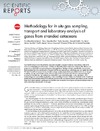Identificador persistente para citar o vincular este elemento:
https://accedacris.ulpgc.es/jspui/handle/10553/45813
| Título: | Methodology for in situ gas sampling, transport and laboratory analysis of gases from stranded cetaceans | Autores/as: | Bernaldo de Quirós Miranda, Yara González Díaz, Oscar Manuel Saavedra Santana, Pedro Arbelo Hernández, Manuel Antonio Sierra Pulpillo, Eva María Sacchini , Simona Jepson, Paul D. Mazzariol, Sandro Di Guardo, Giovanni Fernández Rodríguez, Antonio Jesús |
Clasificación UNESCO: | 310907 Patología | Palabras clave: | Gas-bubble lesions Cetaceans Military maneuvers Stranded cetaceans |
Fecha de publicación: | 2011 | Publicación seriada: | Scientific Reports | Resumen: | Gas-bubble lesions were described in cetaceans stranded in spatio-temporal concordance with naval exercises using high-powered sonars. A behaviourally induced decompression sickness-like disease was proposed as a plausible causal mechanism, although these findings remain scientifically controversial. Investigations into the constituents of the gas bubbles in suspected gas embolism cases are highly desirable. We have found that vacuum tubes, insulin syringes and an aspirometer are reliable tools for in situ gas sampling, storage and transportation without appreciable loss of gas and without compromising the accuracy of the analysis. Gas analysis is conducted by gas chromatography in the laboratory. This methodology was successfully applied to a mass stranding of sperm whales, to a beaked whale stranded in spatial and temporal association with military exercises and to a cetacean chronic gas embolism case. Results from the freshest animals confirmed that bubbles were relatively free of gases associated with putrefaction and consisted predominantly of nitrogen. | URI: | https://accedacris.ulpgc.es/handle/10553/45813 | ISSN: | 2045-2322 | DOI: | 10.1038/srep00193 | Fuente: | Scientific Reports [ISSN 2045-2322], v. 1 |
| Colección: | Artículos |
Citas SCOPUSTM
31
actualizado el 08-jun-2025
Citas de WEB OF SCIENCETM
Citations
25
actualizado el 01-mar-2026
Visitas
279
actualizado el 15-ene-2026
Descargas
201
actualizado el 15-ene-2026
Google ScholarTM
Verifica
Altmetric
Comparte
Exporta metadatos
Los elementos en ULPGC accedaCRIS están protegidos por derechos de autor con todos los derechos reservados, a menos que se indique lo contrario.
